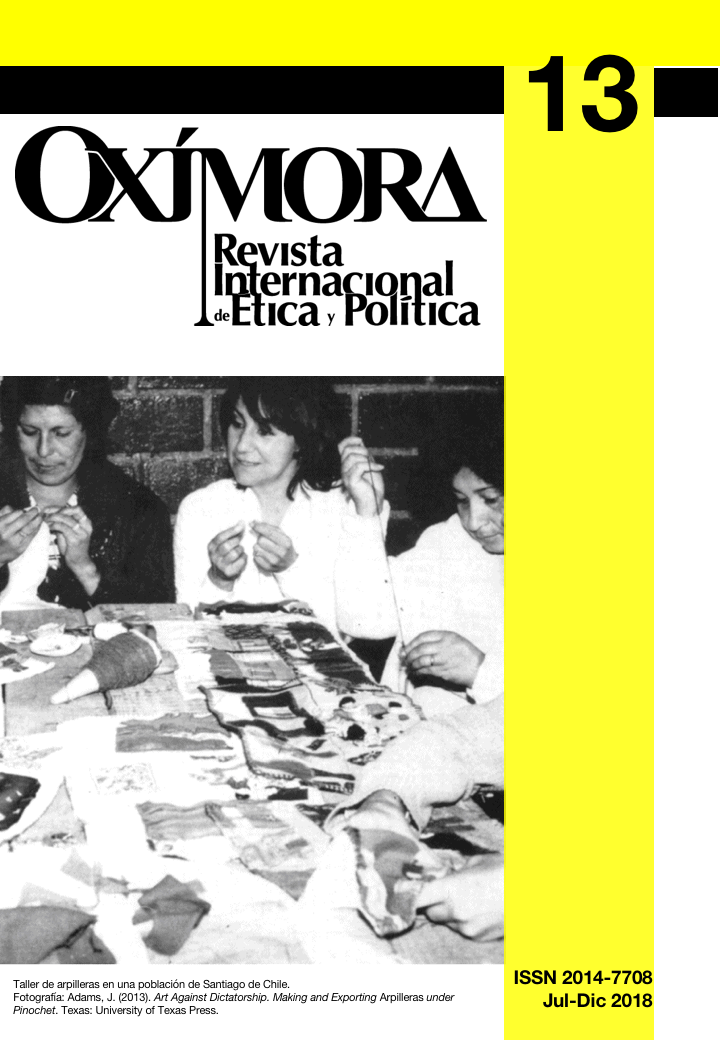Guy Debord 2.0: Towards an Analysis of the Commodification of Subjectivity in Social Networks
DOI:
https://doi.org/10.1344/oxi.2018.i13.21573Keywords:
Commodification, Social Networks, Spectacle, Identity, Subjectivity, IdeologyAbstract
In this paper, I propose to critically update the concept of spectacle coined by Guy Debord in his work ‘The society of spectacle’. By means of this concept, I suggest to interpret the practices of self-promotion in the web 2.0 as a form of identity commodification. To this effect, the concept of spectacle is described as the critique of an ideology that transforms human relations into relations between commodities. Afterwards, I examine how this ideology might be influencing how individuals articulate their identity in social networks. Finally, some problems are raised in relation to how Debord understands ideology, suggesting different ways to rescue the critical and analytical potential of his proposal.
References
ARIAS-MALDONADO, Manuel (2016). “La digitalización de la conversación pública: redes sociales, afectividad política y democracia”. Revista de Estudios Políticos, nº173, Julio-Septiembre, pp. 27-54.
BAUDRILLARD, Jean (2009). La sociedad de consumo. Sus mitos, sus estructuras. Madrid: Siglo XXI.
BAUMAN, Zygmunt (2007). Vidas de consumo. Buenos Aires: Fondo de Cultura Económica.
BUTLER, Judith (2001a). “¿Qué es la crítica? Un ensayo sobre la virtud de Foucault”. Consultado el 22 de febrero de 2018, Instituto Europeo para Políticas Culturales Progresivas, en http://eipcp.net/transversal/0806/butler/es.
BUTLER, Judith (2001b). Mecanismos psíquicos del poder. Teorías sobre la sujeción. Madrid: Ediciones Cátedra.
BUTLER, Judith (2007). El género en disputa. El feminismo y la subversión de la identidad. Barcelona: Paidós.
BUTLER, Judith (2009). Dar cuenta de sí mismo. Violencia ética y responsabilidad. Buenos Aires/Madrid: Amorrortu editors.
CHIAPELLO, Éve (2003). “Reconciling the Two Principal Meanings of the Notion of Ideology: The Example of the Concept of the «Spirit of Capitalism»”. European Journal of Social Theory, 6 (2): pp. 155–171.
DAVIS, Joseph E (2003) “The commodification of the self”. Hedgehog Review, 5 (2), pp. 41 – 49.
DEBORD, Guy (1999). La sociedad del espectáculo. Valencia: Pre-textos.
FINLAYSON, Gordon (2007). “Political, moral, and critical theory. On the practical philosophy of the Frankfurt School”. En ROSEN, Michael. y LEITER, Brian. (eds.), The Oxford Handbook of Continental Philosophy. New York: Oxford University Press.
FOUCAULT, Michel (1994). “¿Qué es la ilustración? [Qu’est-ce que les Lumières?]”, Actual, 28, pp. 1-17.
FOUCAULT, Michel (1995) “¿Qué es la crítica? [Crítica y Aufklärung]”, Daimon, Revista de Filosofía, 11, pp. 5-25.
FOUCAULT, Michel (1998). “El sujeto y el poder”. Revista Mexicana de Sociología, 50 (3), pp. 3-20.
FOUCAULT, Michel (2009). Nacimiento de la biopolítica: curso en el Collège de France (1978 – 1979). Madrid: Akal.
FULCHER, James (2004). Capitalism: A Very Short Introduction, Oxford/New York: Oxford University Press.
FUCHS, Christian, y DYER-WITHEFORD, Nick (2012). “Karl Marx @ Internet Studies”. New Media & Society. , pp. 782 – 796.
LÓPEZ GIL, Silvia (2014). “Ontología de la precariedad en Judith Butler. Repensar la vida en común”. ENDOXA: Series Filosóficas, 34, pp. 287-302.
HAN, Byung-Chul (2014). Psicopolítica. Barcelona: Herder.
HEARN, Allison (2008). “‘Meat, Mask, Burden’. Probing the contours of the branded ‘self’”. Journal of Consumer Culture. 8 (2), pp. 163-183.
JAPPE, Anselm (1998). Guy Debord. Barcelona: Anagrama.
JAPPE, Anselm (2016). Las aventuras de la mercancía. Logroño: Pepitas de Calabaza.
KAUFMANN, Vincent (2006). The Lessons of Guy Debord. October, 115, pp. 31-38.
LAVAL, Christian. y DARDOT, Pierre (2013). La nueva razón del mundo. Ensayo sobre la sociedad neoliberal. Barcelona: Gedisa.
MARTÍNEZ-BASCUÑÁN, Máriam (2015). “Democracia y Redes Sociales: El ejemplo de Twitter”. Revista de Estudios Políticos, nº168, Abril-Junio, pp. 175 – 198.
MARX, Karl (1946). El capital: crítica de la economía política, vol. h1 . México: Fondo de Cultura Económica.
MARX, Karl (1844), “Economic and Philosophical Manuscripts”. En MCLELLAN, David (ed.) (1977). Karl Marx: Selected Writings. New York: Oxford University Press.
MILLER, Daniel (2003). “Could the Internet de-fetishise the commodity?”. Environment and Planning D: Society and Space. 21, pp. 359 – 372.
MOROZOV, Evgeny (2011). The Net Delusion. The Dark Side of Internet Freedom. New York: Public Affairs.
RENDUELES, César (2016). “La ciudadanía digital. ¿Ágora aumentada o individualismo postmaterialista?” Revista Latinoamericana de Tecnología Educativa 15(2), pp. 15-24.
REVELEY, James (2013). “Understanding Social Media Use as Alienation: A Review and Critique”. E-Learning and Digital Media. 10 (1), pp. 83 – 94.
RICOEUR, Paul (1986). Lectures on Ideology and Utopia. New York: Columbia University Press.
SOMBART, Werner (1930). “Capitalism”. En SILLS, David L. (ed.). Encyclopaedia of the Social Sciences, vol. 3. New York: Macmillan.
SIBILIA, Paula (2008). La intimidad como espectáculo. Buenos Aires: Fondo de Cultura Económica.
STREECK, Wolfgang (2014). “How will Capitalism end?”. New Left Review, 87, pp. 35-64.
WALLERSTEIN, Immanuel (1983). Historical Capitalism. London: Verso.
WEBER, Max. (1922) “The Concepts and Types of Profit-Making. The Role of Capital”. En ROTH, Guenther. y WITTICH, Claus. (eds.). Economy and Society. An Outline of Interpretive Sociology. Berkeley/Los Angeles/London: University of California Press.
WOOD, Ellen Meiksins (2002). The Origin of Capitalism: A Longer View. London/New York: Verso.
ZAFRA, Remedios (2015). Ojos y capital. Bilbao: Consonni.
ŽIŽEK, Slavoj. (ed.). (1994). Mapping ideology. London/New York: Verso.
Downloads
Published
How to Cite
Issue
Section
License
a) Authors retain copyright and grant the journal the right of first publication.
b) Texts will be published under a Creative Commons Attribution License that allows others to share the work, provided they include an acknowledgement of the work’s authorship, its initial publication in this journal and the terms of the license.



